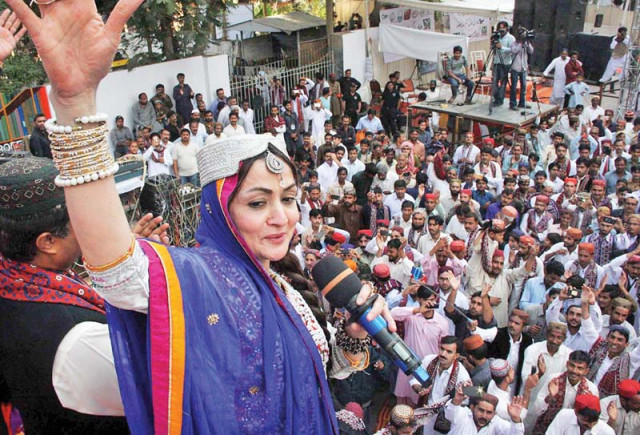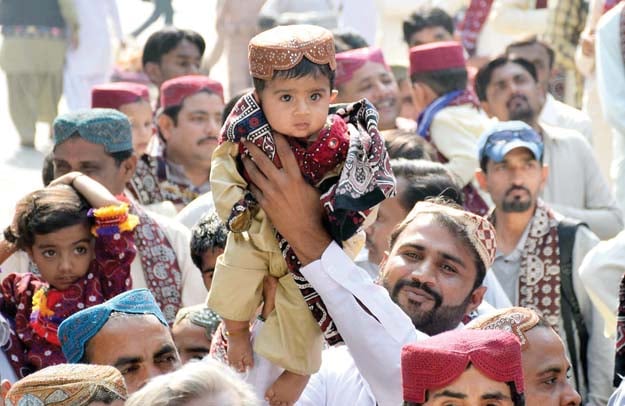Ekta deharo: People dance to the beat of Sindhi folk songs
Zealous crowds of men, women and children celebrate Sindh Culture Day across province

People across the province marked cultural day with excitement and joy. PHOTOS: ONLINE/INP
An event was held at Karachi Press Club on Sunday, where hundreds of people dressed in white shalwar kameez, with colourful ajrak draped around their shoulders and sporting traditional Sindhi caps on their heads, gathered in groups and shouted slogans of 'Jiye Sindh [Long Live Sindh]'. The colourful event, which included famous singers who sang folk songs, was enjoyed by the audience. The participants not only included men as women and children also actively participated in the event.
A participant, Raj Jhokio, who had come from upper Sindh to attend the event, said it is good that by celebrating Sindh's culture, people can keep it alive for our youngsters. "Our culture is very rich and even youngsters enjoy celebrating it," he said, adding that his children insisted and compelled him to take part in the event.
US Consulate marks Sindh Culture Day
The event was more like a folk concert where famous Sindhi singers entertained the crowd. The audience performed dhamal when singers Shazia Khush and Ahmed Mughal sang their Sufi dhamal songs.

Sindh is the land of peaceful farmers, labourers and fishermen, said Laal Muhammad Chandio of Awami Jamhori Party, who had reached the event along with a rally. Sindh has welcomed everyone from all across the country who come here to find employment, he said. The people of Sindh find everyone who comes here their brother and together they will keep the culture alive, Chandio added.
Stalls displaying ajraks, traditional caps, waist coats, traditional stuff and handicrafts were put on display on various stalls set up in the surrounding of the press club. "Although I have lived in Karachi and have never been to upper Sindh, the Sindhi culture is still very close to me. I am a Karachiite but I celebrate it along with my families," said Muhammad Aslam, a banker by profession who attended the celebrations along with his family.
"The soil of Sindh is pure because it belongs to Sufi saints such as Sacchal Sarmast, Shah Abdul Latif Bhitai, Abdullah Shah Ghazi and Lal Shahbaz Qalandar, who spread the message of love and eradicated hatred among the people," said an elderly participant, Mubarak Ali Khan Talpur, who belonged to Khairpur. Talpur added that this celebration is a reminder for everyone to spread the message of love, peace and harmony. To ensure safety and security, the police remained on high alert where the event was organised and those who attended the event had to go through security check and scanners.
People take to streets on culture day
Making the diverse hues of Sindhi culture omnipresent, multitudes of people swarmed the main roads and squares in Hyderabad, Mirpurkhas and Nawabshah divisions.
"Observing this day every year keeps bringing us closer to our culture," said Rubina Shaikh, a university student participating in one of the dozen rallies that were taken out in Hyderabad. Alongside groups of residents, political and nationalist leaders and their supporters also took to the streets in traditional dresses to relish and demonstrate their affinity with the culture.
"There are dozens of nationalist and mainstream parties that claim to represent people of Sindh. But we see them at loggerheads most of the time. However, today they all are united under one culture," said Nabeel Sahito, who was also participating in a rally outside the Hyderabad Press Club.
The culture day, which was earlier referred to as Sindhi cap and ajrak day, was first marked in 2009 in reaction to criticism over former president Asif Zardari, who wore a Sindhi cap during an official visit to Afghanistan. However, the day was called not by the Pakistan Peoples Party but instead by a Sindhi news channel's owner, Ali Kazi.
"For centuries, Sindhis have kept their civilisation, language and culture closer to their heart, protecting them and promoting them," said Sindh information adviser Maula Bux Chandio, who led a rally in Hyderabad. The Muttahida Qaumi Movement-Pakistan's elected legislators also celebrated the day and distributed Sindhi caps and ajraks among journalists in Hyderabad.
Expressing love for motherland
People wearing traditional caps and ajraks took to the streets across upper Sindh on Sunday to express their love for their motherland and its colourful culture. Many of the people started the celebrations late Saturday night, while tents were set up at many places where a large number of people gathered and danced to the tune of Sindhi folk songs around bonfires.
The businesses of people who are involved in making and selling of Sindhi caps and ajraks flourished due to the celebrations on culture day. A boy, who was selling Sindhi caps, told The Express Tribune that he has sold more than 300 caps during the last two days. Smiling sheepishly, the cap vendor admitted that he has been selling these caps from Rs150 to Rs200 and has earned more than 100% profit. "I wish such an event continues throughout the year so that poor people like us can mint money," he said.
A group of peasants, who had come from Kandhra on two vehicles, were dancing on the beats of Sindhi folk songs. Our culture is centuries old and is very rich as compared to the other civilisations, said an elderly man, Arbab Ghumro. "My father used to tell us that nations are recognised through their culture and I am proud to be a son of Sindh dharti," he added.
Digitalised work: Sindh’s Board of Revenue to introduce smart cards
The transgender community also celebrated Sindhi Culture Day to express their solidarity with Sindh. While speaking to The Express Tribune, Sanam Welfare Association chairperson Sanam Fakir congratulated the people of Sindh for celebrating the culture day. According to her, this day is like a binding force for the people living in Sindh, irrespective of their class or language. Just like other people, the transgender community celebrates this day every year, she said, adding that on other days, they dance to earn livelihood, but, on Sindh Culture Day, they are dancing for their motherland.
Published in The Express Tribune, December 5th, 2016.



















COMMENTS
Comments are moderated and generally will be posted if they are on-topic and not abusive.
For more information, please see our Comments FAQ